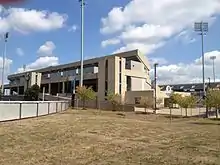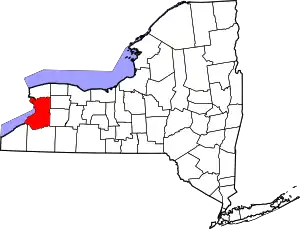Amherst, New York
Amherst (/ˈæmhərst/ (![]() listen)[3]) is a town in Erie County, New York, United States. Amherst is the most populated town in western New York, and an inner ring suburb of Buffalo. As of the 2010 census, the town had a total population of 122,366.[4] This represents an increase of 5.0% from the 2000 census.[5]
listen)[3]) is a town in Erie County, New York, United States. Amherst is the most populated town in western New York, and an inner ring suburb of Buffalo. As of the 2010 census, the town had a total population of 122,366.[4] This represents an increase of 5.0% from the 2000 census.[5]
Amherst, New York | |
|---|---|
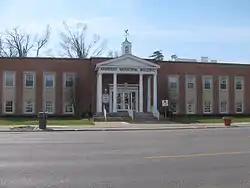 Amherst Municipal Building | |
 Flag | |
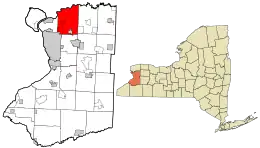 Location in Erie County and the state of New York. | |
.svg.png.webp) Location of New York in the United States | |
 Amherst, New York Location in Erie County and the state of New York.  Amherst, New York Amherst, New York (the United States) 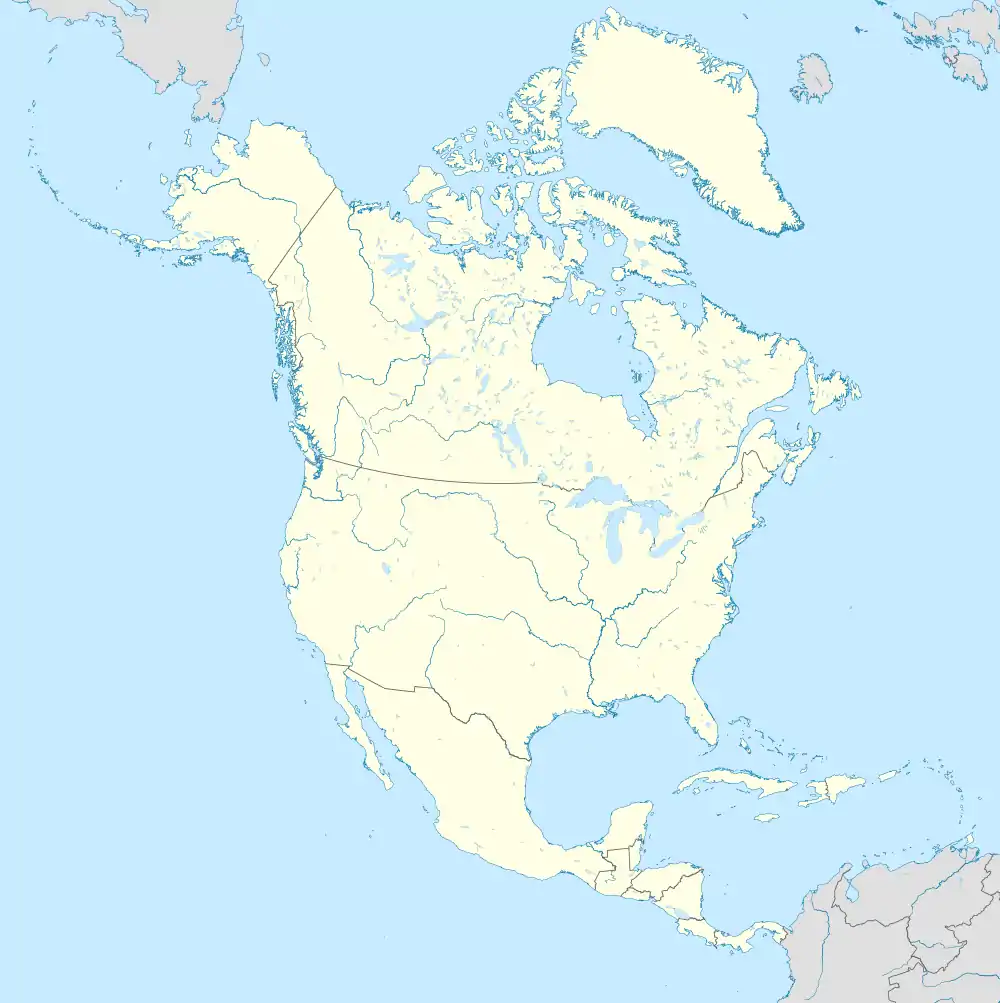 Amherst, New York Amherst, New York (North America) | |
| Coordinates: 42°58′42″N 78°48′00″W | |
| Country | |
| State | |
| Incorporated | April 10, 1818 |
| Named for | Lord Jeffrey Amherst |
| Government | |
| • Type | Town Council |
| • Supervisor | Brian Kulpa (D) |
| Area | |
| • Total | 53.58 sq mi (138.78 km2) |
| • Land | 53.20 sq mi (137.78 km2) |
| • Water | 0.39 sq mi (1.00 km2) 0.73% |
| Elevation | 594 ft (181 m) |
| Population (2010) | |
| • Total | 122,366 |
| • Estimate (2019)[2] | 126,082 |
| • Density | 2,364.58/sq mi (912.96/km2) |
| Time zone | UTC-5 (EST) |
| • Summer (DST) | UTC-4 (EDT) |
| ZIP code | 14051, 14068, 14221, 14226, 14228 |
| Area code(s) | 716 |
| FIPS code | 36-029-02000 |
| Website | www |
The second largest in area and the most populous suburb of Buffalo, New York, the town of Amherst encompasses the village of Williamsville as well as the hamlets of Eggertsville, Getzville, Snyder, Swormville, and East Amherst. The town is in the northern part of Erie County and borders a section of the Erie Canal.
Amherst is home to the north campus of the University at Buffalo, the graduate campus of Medaille College, a satellite campus of Bryant & Stratton College, and Daemen College.
History
The town of Amherst was created by the State of New York on April 10, 1818 from part of the town of Buffalo (later the city of Buffalo), which itself had previously been created from the town of Clarence. Amherst was named after Lord Jeffrey Amherst, commander-in-chief of the British army in North America from 1758 to 1763. Timothy S. Hopkins was elected the first supervisor of the town in 1819. Part of Amherst was later separated to form the town of Cheektowaga on March 22, 1839.[6]
The opening of the Erie Canal in 1825 spurred Amherst's growth, bringing with it with new settlers and increased commerce. German immigrants settled in the northern part of the town as farmers, attracted by the fertile land in the area. The town's water resources encouraged the development of grist mills, saw mills, and other factories along Ellicott Creek.[7] Several communities and hamlets started to develop around this time, such as Williamsville (1810s), Eggertsville and Snyder (1830s), East Amherst and Swormville (1850s), and Getzville (1860s).
Geography
According to the United States Census Bureau, the town has a total area of 53.6 square miles (138.8 km2), of which 53.2 square miles (137.8 km2) is land and 0.39 square miles (1.0 km2), or 0.73%, is water.[8]
Much of Amherst was originally floodplain and marshland, portions of which have been drained in recent years to facilitate development of new homes and businesses. The central and southern parts of the town are heavily suburbanized. Despite this development, the hamlets of Eggertsville and Snyder and the village of Williamsville have managed to retain much of their original character. The northern part of the town is still relatively undeveloped, with the prominent exception of the portions along Niagara Falls Boulevard (U.S. Route 62) bordering the towns of Tonawanda and Wheatfield. Some sections of northern and eastern Amherst have experienced problems with collapsing residential foundations as a result of unstable soil conditions. A few active farms may still be found in the northern part of the town.
Amherst is bordered on the north by Tonawanda Creek and Niagara County. Ellicott Creek flows through the town.
Adjacent cities and towns
- Niagara County, Town of Pendleton - north
- Niagara County, City of North Tonawanda - northwest
- Town of Tonawanda - west
- City of Buffalo - southwest
- Town of Lancaster - southeast
- Town of Cheektowaga - south
- Town of Clarence - east
Neighborhoods
Areas within Amherst are referred to by the former post office station names and are not legally incorporated. During the 1990s, many of these regional post offices were closed and consolidated into the central Amherst 14226 post office on Bailey Avenue, leaving only a Williamsville (14221) post office on Sheridan Drive, a Getzville (14068) post office on Millersport Highway, and an East Amherst (14051) post office on Transit Road. Mailing addresses to areas within the town are Amherst, East Amherst, Eggertsville, Getzville, Snyder, and Williamsville. These postal districts are still recognized by the post office and widely referred to by citizens.
Some of these mailing addresses overlap: some areas of Clarence directly east of Transit Road have Williamsville addresses, although for the purposes of taxes, schools and community resources, these people are residents of the Town of Clarence.
The areas listed below are governed and run by the Town of Amherst except for the Village of Williamsville, an independent political entity.
- Eggertsville -- a hamlet in the southwest part of the town, bordering on Buffalo and centered around Eggert Road. Daemen College is located on Main Street (Route 5). The community is named after early postmaster Christian Eggert.
- Getzville -- a location near the center of the town adjacent to Campbell Boulevard (Route 270) and Dodge Road. The name comes from early resident Joseph Getz.
- Audubon - A location in the center of the town situated around John James Audubon Parkway. The town police, courthouse, and main library are located here.
- East Amherst (formerly Transit Station) -- An unincorporated community, or hamlet, in the eastern part of the town, shared with the Town of Clarence.
- North Bailey -- A location at the junction of Bailey Avenue and Maple Road.
- Snyder (originally Snyderville after postmaster Michael Snyder) -- A suburban community located between Eggertsville and the village of Williamsville.
- Swormville - A hamlet in the eastern part of the town, shared with the Town of Clarence. Named for Adam Schworm, prominent landowner and businessman.
- West Amherst - A location in the northwestern part of the town bordered by Niagara Falls Boulevard (US 62) to the west, Sweet Home Road to the east and Maple Road to the south. Principally the section of the town which comprises the Sweet Home central school district.
- Williamsville - an incorporated village within Amherst, located in the southern part of the town.
Economy
In July 2010, CNNMoney ranked Amherst 42nd in a list of the Top 100 Best Places to Live in America.[11] In 2012, CNNMoney.com ranked Amherst 50th.[12] In 2011 and 2012, Amherst was selected as one of America's 100 Best Communities for Young People by America's Promise Alliance.[13]
Arts and culture
Many festivals are celebrated in Amherst throughout the year. The town is home to the Buffalo Niagara Heritage Village.
The Town of Amherst Archival Research Center is located in the Harlem Road Community Center, 4255 Harlem Road, Amherst NY 14226 (previously housed in the Former Reformed Mennonite Church[14] which was listed on the National Register of Historic Places in 2003.[15])
Sports
Amherst is home to the University at Buffalo Stadium, Alumni Arena, and Amherst Audubon Field, all utilized by the University at Buffalo Buffalo Bulls.
The Northtown Center is the town's ice hockey arena. The arena is the home of the Buffalo Beauts of the National Women's Hockey League, the University at Buffalo Bulls men's ice hockey team, and the Buffalo Wings, a professional inline hockey team competing in Major League Roller Hockey.
Demographics
| Historical population | |||
|---|---|---|---|
| Census | Pop. | %± | |
| 1820 | 768 | — | |
| 1830 | 2,489 | 224.1% | |
| 1840 | 2,451 | −1.5% | |
| 1850 | 4,153 | 69.4% | |
| 1860 | 5,086 | 22.5% | |
| 1870 | 5,265 | 3.5% | |
| 1880 | 4,319 | −18.0% | |
| 1890 | 4,014 | −7.1% | |
| 1900 | 4,223 | 5.2% | |
| 1910 | 4,629 | 9.6% | |
| 1920 | 6,286 | 35.8% | |
| 1930 | 13,181 | 109.7% | |
| 1940 | 19,356 | 46.8% | |
| 1950 | 31,407 | 62.3% | |
| 1960 | 57,439 | 82.9% | |
| 1970 | 90,734 | 58.0% | |
| 1980 | 108,706 | 19.8% | |
| 1990 | 111,740 | 2.8% | |
| 2000 | 116,510 | 4.3% | |
| 2010 | 122,366 | 5.0% | |
| 2019 (est.) | 126,082 | [2] | 3.0% |
| Historical Population Figures [16][17] | |||
As of the census of 2010, there were 122,366 people, 48,894 households, and 29,840 families residing in the town. There were 51,179 housing units. The racial makeup of the town was 83.8% White, 5.7% African American, 0.2% Native American, 7.9% Asian, 0.0% Pacific Islander, 0.5% from other races, and 1.8% from two or more races. Hispanic or Latino of any race were 2.3% of the population.[18]
There were 48,894 households, out of which 26.0% had children under the age of 18 living with them, 49.4% were married couples living together, 8.9% had a female householder with no husband present, and 39.0% were non-families. 27.1% of all households were made up of individuals, and 31.6% had someone living alone who was 65 years of age or older. The average household size was 2.33 and the average family size was 2.98.[18]
The median income for a household in the town was $55,427, and the median income for a family was $68,951. Males had a median income of $51,667 versus $32,030 for females. The per capita income for the town was $27,647. About 4.2% of families and 6.4% of the population were below the poverty line, including 6.6% of those under age 18 and 5.4% of those age 65 or over.[18]
51.7% of residents (aged 25 and over) have obtained a Bachelor's degree or higher, including 26.7% with a Graduate or professional degree.[18][19]
Education
Higher education
There are five separate higher educational institutions with campuses in the town.
- The North Campus of the University at Buffalo, a nationally ranked tier 1 research university. It is the only university in Amherst.
- All university programs apart from architecture, planning, nursing, dentistry, medicine, pharmacy, and public health reside here.
- Daemen College
- One of three campuses of Erie Community College
- Bryant and Stratton College
- A satellite campus of Canisius College
Public schools
There are four separate public school districts within the town.
- The largest district and comprises the eastern half of the town along with portions of the Town of Clarence. The district is ranked #1 out of 97 public school systems in Western New York.[20] Williamsville high schools were awarded Silver rankings according to 2013 U.S. News & World Report Best High Schools, and rank among the top 2-3% out of over 21,000 high schools nationally.[21]
- Covering the southwestern portion of the town with its core in the Eggertsville and Snyder areas.
Government
Crime and public safety
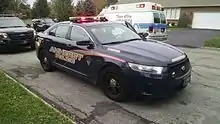
As of 2014, the Amherst Police Department employed 154 officers and 35 full and part-time civilian employees including the Chief, Assistant Chief, and eight captains.[23]
Amherst has been ranked as the "Safest City in America" 1996–1998, 2000–2003, and 2010. In many other years it ranked in the top 5. The ranking is based on annual reports by the FBI, including crime statistics in six categories: murder, rape, robbery, aggravated assault, burglary, and auto theft.
In 2006, Amherst was ranked the second safest city in the United States, after Brick Township, New Jersey.[24] In 2011, it ranked 6th safest out of 400 cities.[25] Most recently in 2014, Amherst was ranked the #1 Safest City in America with a population between 100,000 and 500,000.[26]
Media
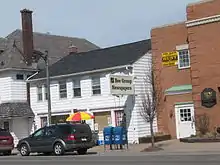
Amherst is served by the Amherst Bee newspaper. In 1969 Paul Kurtz founded the publishing house Prometheus Books in Amherst.
Infrastructure
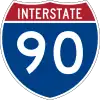
 Interstate 90 (New York State Thruway) passes through the southern part of town.
Interstate 90 (New York State Thruway) passes through the southern part of town. Interstate 290 (Youngmann Memorial Highway) travels through the town diagonally from I-90 to US 62 and beyond to Tonawanda, NY.
Interstate 290 (Youngmann Memorial Highway) travels through the town diagonally from I-90 to US 62 and beyond to Tonawanda, NY. Interstate 990 (Lockport Expressway), located entirely within the Town of Amherst, runs in a roughly north–south direction through the southwest and central part of Amherst until it ends at Millersport Hwy (NY 263).
Interstate 990 (Lockport Expressway), located entirely within the Town of Amherst, runs in a roughly north–south direction through the southwest and central part of Amherst until it ends at Millersport Hwy (NY 263). U.S. Route 62 marks the west town line as Niagara Falls Blvd. as the route heads north, then as Sheridan Drive then Bailey Avenue heading south out of town.
U.S. Route 62 marks the west town line as Niagara Falls Blvd. as the route heads north, then as Sheridan Drive then Bailey Avenue heading south out of town. New York State Route 5 (Main Street) passes through the town.
New York State Route 5 (Main Street) passes through the town. New York State Route 78 (Transit Road) marks the eastern town line.
New York State Route 78 (Transit Road) marks the eastern town line. New York State Route 240 (Harlem Rd.) is a north–south road from Sheridan Dr. (NY 324) south heading out of town.
New York State Route 240 (Harlem Rd.) is a north–south road from Sheridan Dr. (NY 324) south heading out of town. New York State Route 263 (mostly Millersport Hwy.) is a north–south road from Bailey Ave. (US 62) to Transit Rd. (NY 78).
New York State Route 263 (mostly Millersport Hwy.) is a north–south road from Bailey Ave. (US 62) to Transit Rd. (NY 78). New York State Route 270 (Campbell Blvd.) is a north–south road from Millersport Hwy. (NY 263) north out of town.
New York State Route 270 (Campbell Blvd.) is a north–south road from Millersport Hwy. (NY 263) north out of town. New York State Route 277 (North Forest Rd., Union Rd.) is a north–south road from Sheridan Dr. (NY 324) south out of town.
New York State Route 277 (North Forest Rd., Union Rd.) is a north–south road from Sheridan Dr. (NY 324) south out of town. New York State Route 324 (Sheridan Dr.) is an east–west road through the town from Niagara Falls Blvd. (US 62) east out of town.
New York State Route 324 (Sheridan Dr.) is an east–west road through the town from Niagara Falls Blvd. (US 62) east out of town.
Millard Filmore Suburban Hospital is located in the center of town on Maple Road.[28]
Notable people
- Eric Andersen, singer-songwriter, grew up in the hamlet of Snyder
- Scotty Bowman, former NHL coach
- Richard J. Burke, journalist
- Jack Davis, industrialist and politician
- Al Dekdebrun, former pro football quarterback and Amherst Town Supervisor
- Dan Gronkowski, former NFL tight end
- Rob Gronkowski, NFL tight end
- Jeffrey Gundlach, bond manager, graduated from Amherst High School
- Chris Hajt, former NHL player
- James P. Hayes, former New York state assemblyman
- Dan Herbeck, journalist for The Buffalo News
- Marc Evan Jackson, comedian
- Bruce Kershner, environmentalist
- Andy Kulberg, bassist
- Nick Langworthy, chair of the New York Republican State Committee
- Wendie Malick, actress
- Norman McCombs, businessman
- Joe Mesi, professional boxer, attended Sweet Home High School
- Ian Murphy, writer
- Harry Neale, hockey broadcaster and former NHL coach
- Keith O'Neil, former NFL player
- Brooks Orpik, NHL defenseman
- Wayne Patrick, former NFL player
- Michael Ranzenhofer, New York State Senator
- Mike Robitaille, former NHL player and current Sabres broadcaster
- Mark Rubin, former NFL player
- Hugh B. Scott, judge
- Billy Sheehan, rock bassist
- Barnett Slepian, murdered physician
- John Stevens, American Idol finalist (2004)
- Satish K. Tripathi, president of the State University of New York at Buffalo
- James Whitmore, actor, attended Amherst High School
- Gordon Yaeger, notable pilot
References
- "2016 U.S. Gazetteer Files". United States Census Bureau. Retrieved Jul 4, 2017.
- "Population and Housing Unit Estimates". Retrieved June 9, 2017.
- "Amherst". Dictionary.com. Retrieved 9 November 2014.
- "US Census Bureau 2010" (PDF). Retrieved 17 December 2012.
- Patrick, Klinck. "Census Results: Amherst Shows Modest Growth Since 2000". Retrieved 17 December 2012.
- Amherst Museum (1997). "A brief history of the Town of Amherst" (PDF). Town of Amherst. Retrieved 2015-05-15.
- ""History of the town of Amherst" (1818 - 1965)".
- "Geographic Identifiers: 2010 Demographic Profile Data (G001): Amherst town, Erie County, New York". U.S. Census Bureau, American Factfinder. Retrieved February 22, 2016.
- Top 101 Snowiest Cities
- "Weatherbase Weather Data". Retrieved 17 December 2012.
- "Best Places to Live 2010". CNNMoney. August 2010. Archived from the original on October 20, 2012. Retrieved 5 May 2015.
- "CNN Money Best Places to Live 2012". Retrieved 17 December 2012.
- "America's Promise Alliance 100 Best Communities for Young people". Retrieved 17 December 2012.
- Claire L. Ross (November 2002). "National Register of Historic Places Registration: Former Reformed Mennonite Church". New York State Office of Parks, Recreation and Historic Preservation. Archived from the original on 2012-06-10. Retrieved 2009-07-17. See also: "Accompanying four photos". Archived from the original on 2012-06-10. Retrieved 2011-10-05.
- "National Register Information System". National Register of Historic Places. National Park Service. March 13, 2009.
- " Fourteenth census of the United States, 1920, 1910, 1900" Department of Commerce and Labor. (1921), page 532. Retrieved 2013-02-16.
- "Decade of change - population and housing trends" (PDF). Town of Amherst. 2003. p. 12. Retrieved February 17, 2013.
- "U.S. Census website". United States Census Bureau. Retrieved 2008-01-31.
- "U.S. Census website". U.S. Census. Retrieved 23 May 2013.
- Thomas, Scott. "2012 school district rankings for Western New York". Retrieved 17 December 2012.
- "2013 US News and World Report Best High Schools". Retrieved 30 April 2013.
- "Town of Amherst Schools and Education". Retrieved 17 December 2012.
- "Archived copy". Archived from the original on 2015-11-24. Retrieved 2015-11-23.CS1 maint: archived copy as title (link)
- City Crime Rankings by Population Group Archived 2007-01-05 at the Wayback Machine
- "CQ Press City Crime Rankings: 2010-2011". Retrieved 17 December 2012.
- http://www.infoplease.com/us/cities/safest-dangerous-cities.html
- Grande, Joseph A. (2004-09-01). Amherst. Arcadia Publishing. p. 39. ISBN 9781439615942.
- "Town of Amherst website". Retrieved 17 December 2012.
External links
| Wikimedia Commons has media related to Amherst, New York. |
